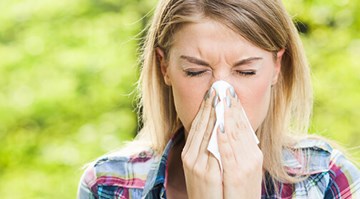If you find yourself sneezing uncontrollably, you may suffer from seasonal allergies. Also known as hay fever or allergic rhinitis, it occurs when your immune system overreacts to a substance that is usually not harmful. As a result, your immune system releases a chemical called histamine, which triggers your allergy symptoms.
The substances that set off your allergies are called allergens. Some examples of common allergens include:
- Pollen
- Ragweed
- Grass
- Cigarette smoke
- Dust mites
- Pet hair or dande
- Cockroaches
- Mold
- Strong fragrances
What Are Allergy Symptoms?
Allergy symptoms that occur in the spring, summer, or fall are seasonal allergies. Perennial allergies are those that happen year-round. Some symptoms of allergic rhinitis include:
- Sneezing
- Runny or stuffy nose
- Itchy nose, mouth, throat, or skin
- Fatigue
- Itchy or teary eyes
How Are Allergies Treated?
Having allergies doesn’t mean you have to suffer. One of the most helpful things you can do is avoid allergens that make your symptoms flare. Here are some ways you can do that:
- Stay inside when mold or pollen counts are high.
- Keep your windows closed in your car and home. Use air-conditioning instead.
- Regularly wash your bedding in hot water to get rid of dust mites.
- Remove wall-to-wall carpeting and use throw rugs you can wash instead.
- Don’t leave food or dirty dishes out, which can attract cockroaches.
- Fix household leaks to prevent mold.
If you can’t completely avoid the allergens you’re sensitive to, there are over-the counter and prescription medicines—as well as treatments—that can reduce your symptoms. Talk with your healthcare provider about which medicines might work best for you.






